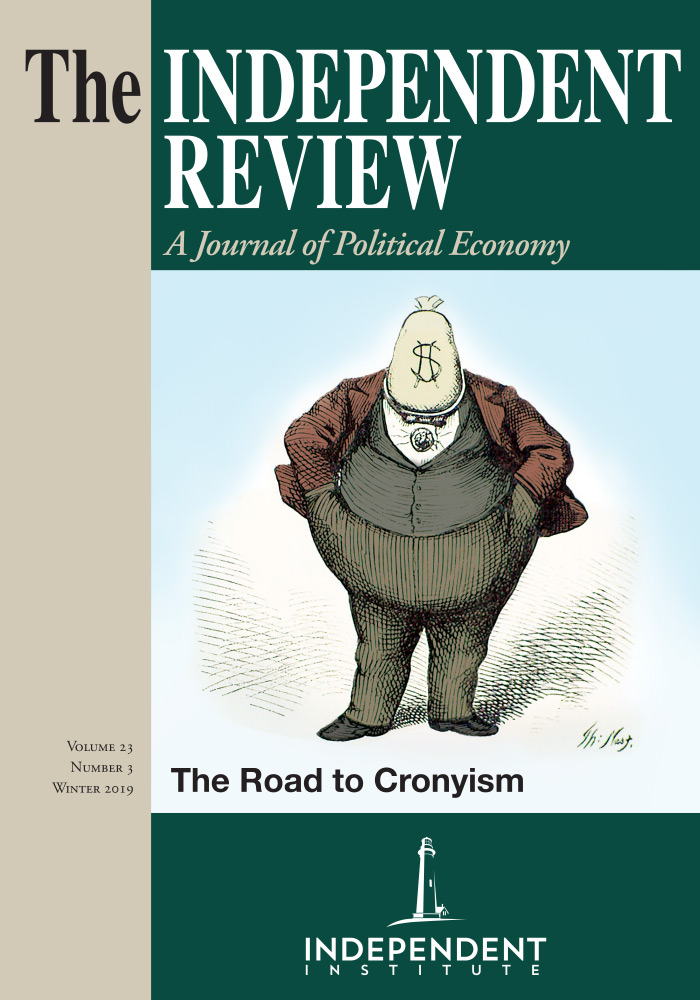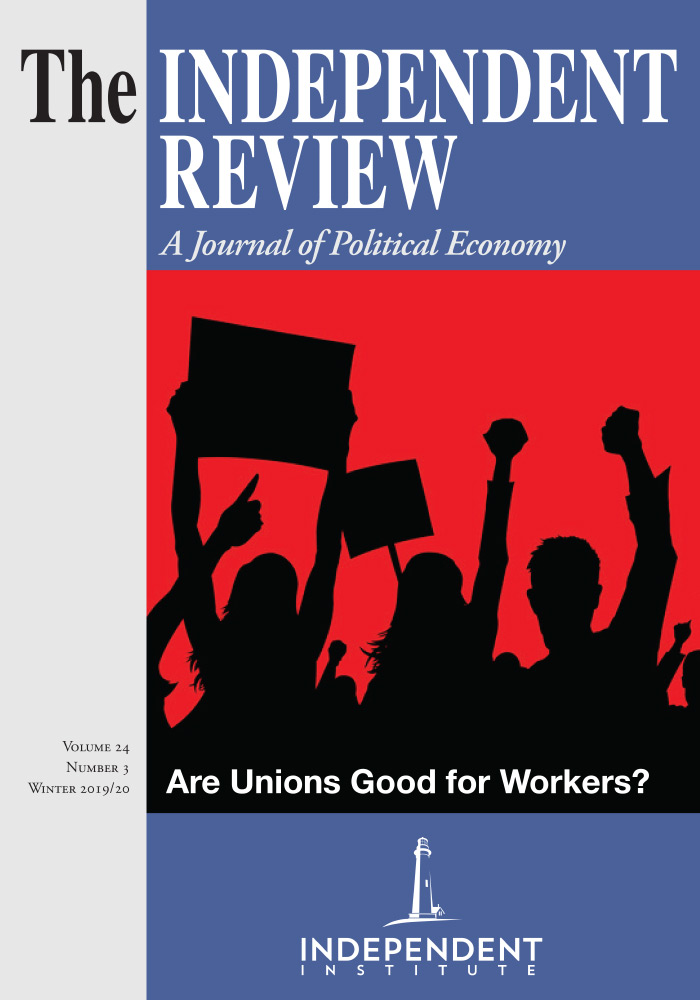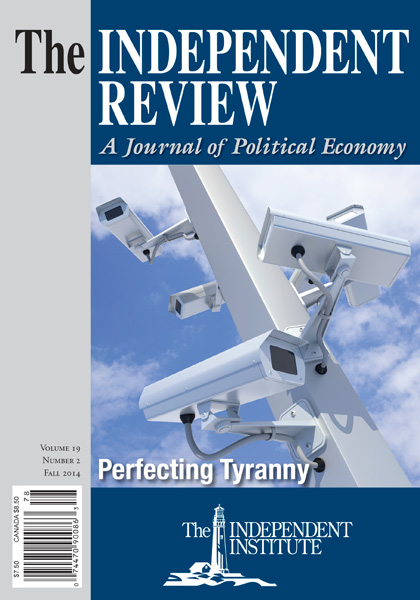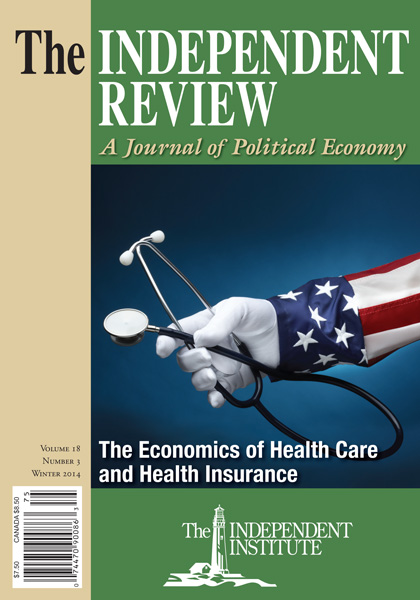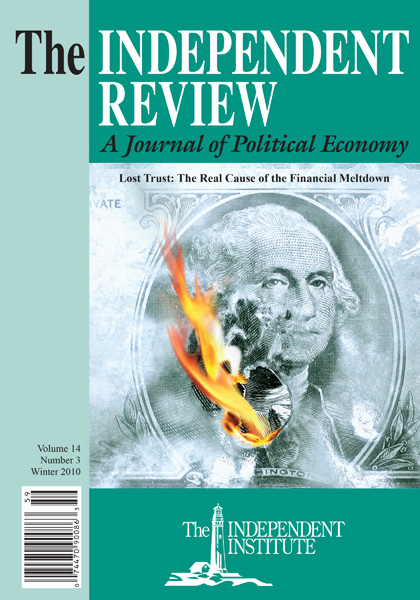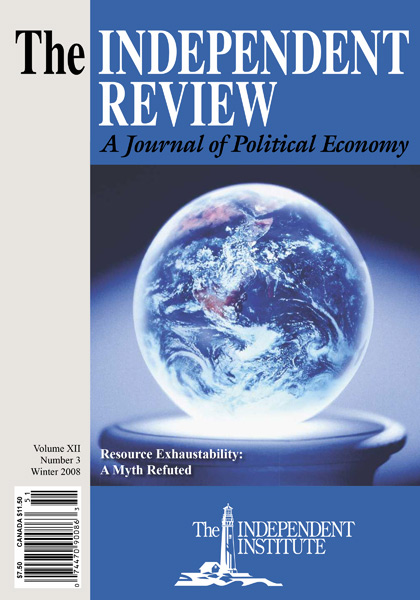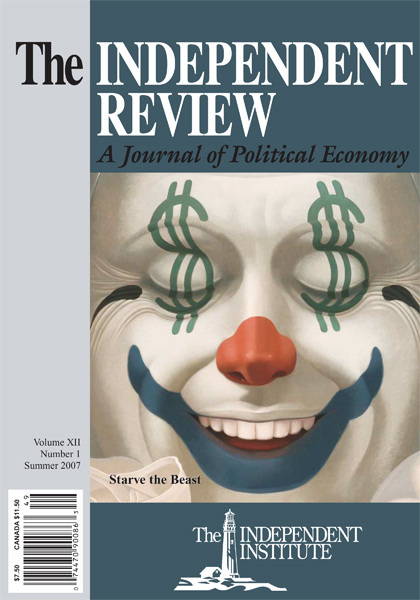Michael Munger and Mario Villarreal-Diaz’s “The Road to Crony Capitalism” is well-written and thought-provoking. In this response, I address the following questions and assertions made by the authors:
“Suppose it’s true that capitalism has a tendency—it’s not inevitable or irreversible, but a tendency nonetheless—to devolve into crony capitalism. Is laissez-faire simply the first step on a kind of road to serfdom, where giant corporate syndicates achieve a parallel kind of economic planning every bit as pernicious as that feared by Hayek?” (332)
“Why would rational politicians eschew using their office to sell valuable services that are entirely within their legal power to provide?” (335)
“Pure capitalism requires politicians to forego their own self-interest for the public good” (336).
“In our terms, respect for the size of total economic activity as a joint goal of the society demands that individual firms leave money on the table” (339).
“Each economic agent would be better if she could give up the ability to seek rents and competitive protection from the state, provided that everyone else gives up the same rights and abilities. So the gains to such an agreement, aggressively enforced, are clear. The question is whether such an agreement can be enforced in a democracy” (339).
“We are simply pointing out that allowing real democracy may doom real capitalism” (339).
“The solution, if there is one, is to empower entrepreneurs not to want to become rent seekers and to constrain state actors not to sell off rents in the first place” (343).
In this response, I will endeavor to demonstrate that reconsideration of these questions and assertions using a framework of property rights will make the strengths and weakness of the model more apparent. That same property rights framework will then serve as the foundation for advancing a comprehensive solution to “cronyism” called citizenship.
Definitions
Rationing is deciding who gets what.
Capitalism is the rationing of scarce resources by individuals who own those particular resources. Critical to that definition is the word “own”. What is “owned” is property. The boundaries of property and their association with particular people are called property rights.
The other major form of rationing discussed in “The Road to Crony Capitalism” is the rationing of scarce resources through violence. In that article, rationing via violence is called by several names, including “cronyism”, “democracy”, and “coercion”.
Violence is any violation of property rights made by someone other than the owner of the property.
Coercion is threats of violence against property (or persons) designed to bring about certain behaviors in the victims.
Democracy is rationing of property by violence and is occasionally directed by voting.
Totalitarianism is rationing of property by violence directed by a single individual or small minority with little or no input from the populace.
Corporations are groupings of individuals working cooperatively within a market and are generally grouped around a particular specialty.
Government is a corporation whose specialty is the targeted application of violence.
Rule of Law is the philosophical conviction that no one is above the law or that the law should apply equally to all individuals in a society. In other words, the rules affecting property are the same for everyone under a rule of law.
Justice is the principle of respecting the property rights of others and/or the expectation of remedy when property rights are infringed upon.
Socialism is a mixed ownership model where government employees have ultimate say over rationing of some or all of the scarce resources within a society and where the resources not directly redistributed by the state are left to individuals to ration as personal property. Socialism is, at a minimum, a two-tiered system with individuals with property cooperating with each other and using the rules of capitalism, whereas a subgroup of individuals in an upper tier are granted the discretion to override the property rights of lower-tier denizens under some circumstances.
The Authors’ Main Concern
“Our question, then—the question of our age—is simple: If real capitalism exists, is it sustainable? Or does capitalism in a democracy always devolve into corporatist cronyism?” (Munger & Villarreal-Diaz, 333)
That’s two questions.
“If real capitalism exists, is it sustainable?”
To answer this part of the question, we must first determine what “real” capitalism means. Capitalism is the rationing of scarce resources by individuals who own those resources. Capitalism requires stable property rights and a general absence of violence. But capitalism does not, in and of itself, create those necessary conditions, though it does have some ability to maintain them after they are established—a feature of competition. For the creation of stable property rights and an initial absence of violence, “we the people” must turn to something outside of capitalism to tame the violence.
Socialist democracy-capitalism is one possible solution. The Chinese have tried a socialist communism-capitalism toward the same end with some success to date. And many Islamic countries have used socialist totalitarian-capitalist regimes toward the same goal with varying degrees of accomplishment. But all of those—democracy, communism, and totalitarianism—are rationing methods that use violence to distribute property. And violence almost always undermines the function of capitalist trading mechanisms, except when used to maintain property rights. So let us say that “real capitalism” is a society where scarce resources are rationed by individuals who own those goods and the only violence present in the society is employed to protect and maintain the property rights of its members. Real capitalism, therefore, is—in theory—a concept independent of the method chosen to establish, maintain, and protect the property rights of its members. This viewpoint sounds practicable on paper, but, to my knowledge, there is not a single country anywhere in the world or in all of history where the warriors in government always and everywhere restrain themselves to only maintaining and protecting individual property rights.
Various means of restraining the harmful use of violence against the property rights of private persons have been attempted in history. These include private bodyguards, revolts and coups, accountants and lawyers, strategic marriages, separation of powers, checks and balances, appointing or electing a civilian head of an organized military and/or police forces, a constitution, separation of church and state, an unregulated press, an armed civilian population, and the diffusion of governmental functions over many, disparate, smaller governments, to name but a few.
The “diffusion of governmental functions over many, disparate, smaller governments” solution to contain and control governmental violence is worthy of extra discussion, if for no other reason than it borrows from the same playbook of competition that the capitalist system uses to protect and maintain property rights for its members. In Munger and Villarreal-Diaz’s own words, “Capitalism limits the extent of damage that can be done even if people are (mostly) selfish because it rests on the competitive limitations on discretion. The argument for capitalism does not require any public spirit or sense of altruistic commitment to the greater good.” In other words, competition limits the harm individuals can do to one another while participating inside a market. And it can work just as well in the market for governmental services.
The ideal of the original United States—where the states were left remarkably independent and a minimalist federal government was established expressly to protect national boundaries, serve as a final arbiter of disputes between states, prevent states from warring with each other, and prevent barriers to trade rising between states—strikes me as excellent attempt at the above-mentioned many small, disparate, competitive governments solution. And, except for a single civil war, it appears to have worked rather well for the U.S. The U.S. is, after all, the largest economy in the world (Viens). Switzerland may be another excellent example of the long-term benefits of the many disparate, small, competitive governments solution. According to Nassim Taleb in Antifragile, Switzerland is “the last major country that is not a nation state but rather a collection of small municipalities left to their own devices” (Chapter 5). And both the U.S. and Switzerland are in the top 10 countries in the world on a GDP per capita basis (Harrington). Not too shabby.
Interestingly, the small competitive state model was mostly abandoned in the U.S. in the early twentieth century – in conjunction with the implementation of a national income tax – in favor of a very strong and far-reaching national government with weak states. So even in countries like the U.S.—where multiple, overlapping, and sometimes redundant fail-safes against the expansion of violent rationing outside of the limits of the ideal minimum necessary for the capitalist market to function exist, and prosperity blossoms because of them—there appears to be an inevitable centralization and expansion of coercive rationing given time—most especially during wartime (Higgs 1987). Does that mean “real capitalism”, even if it could be established, could not be sustained? No. Not necessarily.
A world war strikes me as exactly the right time when a thinking population would desire to maximize the effectiveness of their federal government even at the expense of their standard of living. So during such a time, it might make a modicum of sense to allow crony interaction between democratic government employees and the capitalist market actors in order to maximize the success of the former even at the cost of the productive potential of the latter. Once peace recurs, however, it probably would make just as much sense to remove the crony back out of the systems and let the markets flourish. But that isn’t what happened.
Stuck in a Trap
Munger and Villarreal-Diaz do a nice job of explaining why it might be difficult to reestablish property rights for individuals once they have been sacrificed to the domain of democratic discretion. Their explanation is given from the perspective of the capitalist. “Of course, that strategy [rent seeking] is ultimately fruitless because stock price or land values rise to capitalize the special privileges, and a normal rate of return is restored. But now the ‘owners’ of the cronyist privileges are stuck, utterly dependent on the discretion of their state masters to maintain the value of the hard-won artificial rents and market regulations” (341).
Michelle Albert Vachris expands on the problem in her article “Dynamism as a Bump on the Road to Crony Capitalism.” On page 372 in the same issue of The Independent Review, she recalls what Munger and Villarreal-Diaz describe as “The Transitional-Gains Trap” and explains it nicely with a quote from Gordon Tullock: “The termination of the particular scheme [any of the many government programs designed to help some particular industry or group] would, in general, lead to large losses for the entrenched interests.”
I will not expound on these problems any further except to point out that “government programs designed to help some particular industry or group” flagrantly fail the test of the rule of law because they disrupt or interfere with the free exercise of the property rights for some individuals in society but not others. It is not absent irony that legislation that violates the rule of law also violates the egalitarian ethos behind democracy. Crony democracy may not qualify as democracy at all.
Tradeoffs: The Devil or the Dollar? Better Democracy or More Ideal Capitalism?
Democracy, in theory, is the use of voting to direct violence when it is used to ration scarce resources. Voting is the key feature that separates democracy from other forms of violent rationing. Unfortunately, voting is time intensive and expensive, especially when used across enormous populations over far-flung distances while using old technology. The high opportunity cost of voting means that, in the real world, nearly all government rationing decisions in a democracy are actually made by elected people using their individual discretion. Democracy in practice is not “everybody deciding on how to ration resources.” It is more like “everybody deciding who will later decide for everybody how rationing occurs.”
Another way to put it is that democracy, in spite of occasionally using a diffuse decision-making algorithm called “majority rule voting” to make decisions, is still, in the main, a hierarchical decision model that uses voting primarily as a substitute tournament contest to determine rank order. Higher ranks afford greater discretion for rationing property than lower ranks.
Capitalism, on the other hand, is a rationing system that regularly uses its widely distributed decision-making algorithm—individual free trade in markets—to make nearly all rationing decisions. In a capitalist system, each individual has ultimate authority over the scarce resources to which they have ownership and no one else.
Munger and Villarreal-Diaz’s questions are based on a hypothetical situation where both democracy and capitalism are active at the same time in different parts of the same society. This fits the definition of socialism given above. Munger and Villarreal-Diaz worry that that mixing of the two systems leads inevitably to a condition they call “Crony Capitalism.” They define Crony Capitalism as “A social system where the government intervenes aggressively into the economy, typically with political instruments that benefit large corporations and enterprises to the detriment of smaller business and private citizens” (332).
Let’s reexamine their definition in light of property rights. Actions and decisions that benefit one group of people at the expense of another group of people is a simple restatement of the concept of rationing—deciding who gets what. “Government intervenes aggressively” is another way of saying rationing using violence. Thus the definition of crony capitalism (which they also call corporatism and cronyism in their article) means ‘a social system where government rations scarce resources using violence.’
Note that that restatement is precisely the definition of totalitarianism and would fit perfectly the definition of democracy if a voting mechanism were added. So their worry, in other words, is that a socialist system that combined a democracy and a capitalist rationing system could swing away from both and end up behaving like a totalitarian regime. Unfortunately, their phrasing of the problem as “Crony Capitalism” misplaces the blame for the expansion/encroachment of totalitarian rationing onto the one rationing tool that does not use violence to determine who gets what—capitalism.
What I am hoping to point out with this focus on property rights distinctions is that democracy is not far removed from totalitarian rationing even on a good day! And there is no need to introduce capitalism to explain a tendency for democracy to decay into totalitarianism. Opportunity costs associated with voting, the corrupting nature of violence, human self-interest, and monopoly power (lack of competition) are enough to explain that pattern of decay even in the absence of capitalism. Munger and Villarreal-Diaz are making a causal argument against capitalism which, from a property rights perspective, is only correlated. In fact, the opposite of their worry may be true. Capitalism probably improves the function of democracy and encourages elected politicians away from totalitarianism.
Consider the following. Government employees are people, and people need information to make decisions. Typically government employees are not elected for their deep knowledge of a particular specialty. But even if they were, most decisions they would confront would doubtless fall outside their special area of competence. It follows, then, that civil servants must interact with capitalist sector individuals to garner the information required to make decisions well—or at least as well as possible. To do otherwise would be to systemically mandate unnecessary and avoidable ignorance into every governmental rationing decision.
Importantly, like running a vote, both acquiring information and providing information is costly and time consuming to each party. Thus, in order for information seekers in the government to obtain knowledge from information keepers in the outside market without injuring them, the seekers must offer a trade. To do otherwise would be equivalent to refusing to feed the goose who lays golden eggs. So government employees must seek counsel from individuals and offer something in trade for their advice—which all sounds very natural in light of the norms and function of a capitalist market system. But those same trades may actually qualify as corrupt practice from the perspective of democracy because reliance on a few persons outside the government literally means the opinions of those individuals—who were not elected—will necessarily weigh heavier in the decisions made by government employees. Which means these “crony” decisions are not egalitarian or even majoritarian and are not much influenced by the discipline of voting. “Cronyism” can be, in other words, democracy striving to be smarter! Albeit at the cost of its formative principles.
Is Government Necessary? If not, Begone, Satan!
One untried solution that could potentially maximize the productive potential of a capitalist society—and therefore the standard of living of everyone in it—involves dissolving the government entirely once a stable market system has been established. As already noted, competition in capitalist markets have a self-regulatory function. A government may not be necessary, and, in fact, may be harmful to the maintenance of an established market economy. It is not difficult to imagine a human community capable of functioning without a hierarchical leader who is capable of revoking property rights as a matter of course. But even if it worked extremely well—or perhaps because it would work so well—invasion by outside governments is a credible risk. A standing army is one decent solution to dissuade and defend against invasion. And a government, I believe, is a standing army.
A second cause for rejection comes from the observation made by Adam Smith that the division of labor—i.e. specialization—improves standards of living. “The division of labour, however, so far as it can be introduced, occasions, in every art, a proportionable increase of the productive powers of labour” (An Inquiry into the Nature and Causes of the Wealth of Nations, 1776, 1:1:4). The productivity gains from specialization are, in Smith’s opinion and in my experience, universally applicable. There is no reason to believe that the activities we now associate with government service, even when restricted only to the maintenance and defense of property rights, could not grow more efficient following specialization.
Therefore I dismiss the model of a capitalist society without a government on the dual grounds that it renders impossible gains from specialization in military matters and because maintenance of a standing army is, in my mind, necessary to deter invasion. If you subscribe to those arguments as well, then we must instead look for a solution that can allow for optimal capitalist market function and a government capable of maintaining property rights for individual members against internal and external invasion but that somehow restrains its governors from privileging their own needs and desires for resources above those of the very same people they were elected or appointed to protect. Fortunately, there is one solution not yet discussed that could potentially meet all of these criteria.
Citizenship
Citizenship is the two-part agreement to 1) not commit violence against other citizens and their property and 2) aid other citizens whose persons or property is harmed or threatened with harm. It is a non-aggression pact and a unified response to aggression contract in one.
One of the several beauties of citizenship as a foundation of a capitalist society is that it is unequivocally formed by individuals and maintained by individuals. Thus the policing action of the contract is not a third party—like a government—that requires special policing by a fourth party which would then require additional oversight by yet a fifth party, and on and on into infinity. Each individual citizen who is party to the citizenship agreement is responsible for restraining themselves and for holding other parties with whom they are trading accountable to it. The consequences of failing to adhere to the tenets of citizenship—committing violence against another citizen’s property—literally activates the duties of all other citizens to aid the victim, even if the aggressor was also a citizen and even if the assailant is a government employee. Thus citizenship defends citizens both from external violence—like invasion—and internal violence—like theft—and from a government’s less blatant excesses—like coercion.
Additionally, citizenship as the foundation of civilization does not necessarily require the abolition of government. It simply provides a different source of legitimacy and direction for government and, in doing so, rearranges the hierarchical position in which government employees are viewed relative to other owners of property. Government, in the presence of true citizenship, is a trade specialty, like any other. Individuals in government are specialists dedicated to fulfilling the obligations of citizenship on behalf of other citizens who pay them for that service. Thus the baker need not run out of his shop to help a bartender extricate every contrary drunk from the premise of his neighbor’s bar. The baker pays the police to go on his behalf. And the policeman who does this on a regular basis is experienced and equipped for violent action, whereas the baker’s skills revolve primarily around ovens and ingredients.
Very importantly, the introduction of professional mediators in the fulfillment of the duties required by citizenship does not release the baker from his or her obligations! If the police are overwhelmed or absent, the baker may still be called upon to personally aid his barkeep neighbor. And if a policeman or military professional threatens a citizen unjustly, that citizen has the right to defend himself and call upon help from others. Thus the power to exercise violence is retained by each individual citizen and the rule of law is satisfied. A hierarchy still exists in society, but the alpha position is occupied by the citizenship agreement and its tenets, not by any person or persons. All citizens are held equal in the regard of the contract until a violation of the agreement occurs, in which case everyone who holds to the tenets remain elevated above those who do not until peace can be reestablished and the concord of the contract is reset.
Said another way, the right to exercise violence in the name of justice is explicitly not ceded to the individuals who serve underneath the banner of “government”, although, as already described, those specialists may take up arms on behalf of others in an effort to satisfy the obligations of many citizens.
Similarly, threats of foreign invasion may overwhelm the fighting capacity of a standing citizen army and the standing police force, in which case a draft may take place, calling additional citizens to service as a posse, peacekeeping force, militia, regional guard, or national armed services. The justification behind the draft, therefore, is citizenship. The justification behind the government is specialization to satisfy citizenship. The justification even for the constitution is citizenship.
Since the ability and responsibility to commit violence is not ceded exclusively to individuals in government by citizens outside that government, private citizens serve as another competitive restraint on the behavior of individuals in government service. If an individual or group in government or in conjunction with government tries to force a citizen to give up their property using coercion, that citizen has a right to defend his property with violence and to call on others to assist in that exercise of self-defense. Thus even a “majority” group trying to force itself on a tiny minority will suddenly find itself well matched or even a minority as the entirety of the citizenry rise up to repel the aggressor group. And this reprisal is not a coup, nor is it treasonous. But it does, like competition, affect incentives in a positive way.
Citizens defending their property have a right to employ violence to curb violence, which produces a real-time punishment for bad actors. It’s the adult version of standing up to bullies. It is showing bullies, “The lines of property are drawn and clear. Each time you step across it, you will get hurt. Even if you manage to take it, you will pay dearly for it.” And since incentives—both positive and negative—matter in regard to human behavior, each violent rejection by the citizenry of violent aggression by government players—or anyone else—will predictably move the future actions of those government employees away from violent acts and toward other means of achieving their desires.
You’ve probably heard the truism that, “All that is necessary for evil to win is for good men to do nothing.” That holds true for citizenship. If some citizens do not stand up for themselves or fail to call for help when attacked or do not aid others when they are threatened, then the citizenship agreement does not, in fact, exist. But you may not have heard this one: “What kills me makes us stronger” (Taleb, Chapter 4).
An illustrative story:
I once encountered a policeman on the road. I missed, apparently, a change in the speed limit and he pulled me over for continuing at the previous speed limit. As he approached my car, I reached for my glove box to get my registration. I wasn’t sure why he had pulled me over at first, but on television the police always ask for license and registration and proof of insurance regardless of the reason for pulling someone over. So I was doing what I thought would get the officer the information he needed and I hoped my efforts would speed his task along so I could get to work on time. Unexpectedly, the policeman grew very agitated and pulled out his firearm and pointed it at my face. He then commanded me to lift my hands above my head, which I did.
“What did I do?” I asked cautiously.
“You don’t know?” he asked incredulously.
“No,” I said tersely. “Otherwise I wouldn’t have asked.”
“You were speeding back there,” he said and flicked his head over his shoulder.
“Fair enough,” I said. “Then is it typical for you to open a conversation with someone you are about to ticket for speeding by pointing a gun at their face?”
“You were reaching for your glove compartment,” he stated.
“I thought you were going to ask for my license and registration.”
“How do I know you don’t have a gun in there?” he asked.
“That’s easy,” I said. “I’ll simply show you.” And I reached to pop open the glove compartment.
He began yelling very aggressively. I lifted my hands above my head as he directed.
“So you don’t want my license and registration?” I clarified.
“I definitely do,” he said scornfully.
“Then you realize I will have to lower at least one of my hands to open the glove compartment,” I said, not amused.
“If you reach for your glove compartment, then I will lodge a bullet in your head. You stay there. I will walk around and open it.”
“Of course you may open it,” I offered in compromise. “As soon as you show me a warrant signed by a judge, because I will not give you consent to touch anything that belongs to me.”
“Ha! So you are hiding something!” he deduced.
“I’ve nothing to hide,” I assured him. “I am simply no longer in any mood to cooperate with you.”
“Why not?” he asked. “If not because you are hiding something?”
“Because you pointed a gun at my face and because you yelled at me,” I said. “Neither of which pleased me. And you are still pointing that weapon at me, by the way.”
We went around and around like this for a while, but we were essentially at an impasse. Eventually I said, “Look. I don’t have a gun. But if it makes you more comfortable, I will keep my hands above my head all day. Regardless, though, I’m going to insist that you cease pointing that firearm at my face before we go any farther.”
“I most certainly will not,” he assured me. “You are in no position to demand anything.”
“You’re wrong,” I said evenly. “I’m going to count backwards from three.” [I have kids. I count sometimes when they aren’t listening.]
He scoffed. “And then what?”
“And then I am going to get out of this car, take that gun away from you, pistol whip you with it, and then call 911 to come and care for your injured body.”
“You’ll be dead before you get to two,” he said.
“Three,” I said. “Is there a camera running in your car?”
“How did you know that? Never mind. Yes. But it won’t help you. It will show me defending myself from a maniac.”
“Two. It will show you killing an unarmed man for the crime of speeding.”
“You can’t sue me if you’re dead,” he pointed out accurately.
“I come from a large family of hard-working, wealthy, competitive, intelligent people,” I told him. “You do not want to face off against them in a courtroom after killing me. It will not go well for you.”
“Don’t you do it,” he said, nervous for the first time.
“One,” I said. And I opened the door and shifted to get out.
“FINE!” he yelled, frustrated, and lifted his gun toward the sky.
I stopped moving and blinked. I was actually confused for a moment, not quite certain where I was or what I was doing. It felt like I was waking from a dream. I wasn’t dead but neither was I wrestling with a policeman. I was somewhere in between.
The policeman holstered his firearm and took out his police baton. He waved it threateningly.
“If you step one foot out of that car I will use this on you.”
“Fair enough,” I said and resumed my seat in the car.
Eventually, with much stopping and starting and him holding his hand on the handle of his holstered revolver the entire time, I eventually got my registration and insurance information out of the glove compartment, gave it to him, and then got a ticket. After he handed me the completed speeding citation, he asked, “Why did you do that? Why did you to risk me shooting you if you didn’t have gun? You had nothing to gain and everything to lose.”
“It is my duty as a citizen to protect myself,” I told him tiredly.
“That’s my job,” the policeman said.
“Yes,” I agreed. “But you were failing to do your job of protecting me. You were acting the part of a bully. So it was my duty to stand up for myself.”
“You shouldn’t have done that,” he said, shaking his head. “It wasn’t worth the risk.”
“That’s only because you haven’t thought through the alternative,” I assured him.
“I don’t know what you are talking about,” he said.
“It’s complicated,” I told him. “And I’m pressed for time.”
“You’re just blowing hot air” he scoffed. “You don’t actually know anything. You’re just saying a lot of empty things to try and make me feel stupid.”
I bit my tongue on my first response and said instead, “Fine. Let’s look at the consequences of me dying entirely from your perspective. First, it will make a lot of paperwork for you. Second, I work. I work a lot. And I make a lot of money when I work. So I pay a lot in taxes. Some of those taxes pay part of your salary. Killing me, therefore, is, in a real but small way, the same as giving yourself a demotion in pay. Kill enough people like me and there wouldn’t be enough money to pay you at all. You’d have to find yourself a different a job. Can you see where I’m going with this? We’re all in this economy together. Injuring any one of us injures us all.”
“What are you, some kind of communist?” he asked accusingly.
I closed my eyes and rubbed the bridge of my nose. “No,” I said. “Just the opposite. But at least you’re starting to consider the bigger picture. Think about it for long enough, and some day you may realize this dance you and I just went through happened precisely because neither of us want to live in that kind of society.”
So back to the original question. Can real capitalism exist? And is capitalism sustainable? Yes. If citizens understand the precepts of the citizenship agreement, fulfill their duties to one another and themselves, and correctly consider the constitution and the government administrators equally subservient to the citizenship pact in the human hierarchy of things. No one person or group of people in a citizen society has a monopoly on violence. Widespread competition is the key to maintaining a stable, virtuous, just, and peaceful civilization. And citizenship establishes that competition against violence as a formal duty in all of its members. Therefore sustainable capitalism is indeed possible.
Possible. But not easy and not free. Thomas Jefferson once wrote, “What country can preserve it’s liberties if their rulers are not warned from time to time that their people preserve the spirit of resistance? let them take arms. the remedy is to set them right as to facts, pardon & pacify them...the tree of liberty must be refreshed from time to time with the blood of patriots & tyrants. it is it’s natural manure.” (Extract from Thomas Jefferson to William Stephens Smith)
A Vote for Private Property
I have often wondered why democracy and capitalism are so often correlated, especially when I know that the violence directed under the banner of “democracy” can so often efficiently destroy the property rights necessary for capitalism to function. The answer, I now think, is the vote.
Property rights can vary considerably between individuals and between different societies. Answering the following questions helps clarify that assertion: Do you own your car? Do you own your house? Do you own the land under your house? The oil under your house? The air above your house? The light that falls on your house? The water that runs by your house? Your job? Your business? Do you own goods produced by your body? Do you own your body? Do you own your children? Do you own your thoughts?
The take home here is that some property lines are obvious, others less so. But in a democracy, there is as least one property right that is given. You own a vote... by definition. And that is a property right distributed diffusely through a society and accepted by most of the population as legitimate. I think that acceptance of a vote as personal property that can be exercised correctly only by the individual from which it originates is the infant seed of capitalism. Thus, in contrast to the concern made by Munger Villarreal-Diaz that capitalism in a democracy has a tendency to devolve into crony capitalism, it is more likely that democracy has a tendency to evolve into capitalism thanks to the peculiar nature of the vote.
The Importance of Free Press to Citizenship
Citizenship is the two-part agreement to 1) not harm other citizens and 2) aid other citizens who are harmed or threatened with harm. Critical to its function is effective communication between individual citizens as to when, where, and how they are being harmed. If other citizens do not know of an attack, they cannot respond to it. And this is why the free press is so important to individuals in a capitalist society.
I have heard of several popular methods for an armed force to defeat an enemy that involves splitting the enemy apart and destroying each pocket of resistance separately. Banning free press, or worse, spreading false information, almost guarantees the citizens will remain unorganized and vulnerable.
The “Other” Citizenship, Government Schools, and Capitalist Colleges
Most people are not aware of the two-part citizenship agreement I have described. They are taught in their government-run schools that citizenship is a title granted to people born within a particular geographic territory that confers many benefits and a few responsibilities that include paying taxes and obedience to government dictates.
“I pledge allegiance to the flag...and to the republic for which it stands...” This perversion of the meaning of citizenship is not surprising in that setting. It is extremely pro-government. And, importantly, that pro-government interpretation carries with it a responsibility to cede decision-making capacity to government officials. This may be the missing link in why high school graduates earn less on average than college graduates. In high school, students are not taught to protect their property rights from government officials, and so they don’t. Thus they cannot benefit fully from the massive productivity/income gains available through self-administration of private property and free market trading. Many colleges, on the other hand, are private institutions. They are free to teach different ideas of what citizenship means and what the responsibilities of citizens are to each other and to government employees. A different understanding of the permeability or impenetrability of property rights when in the presence of authority figures may explain the “edge” college graduates appear to have in surveys of lifetime earnings.
The End of the World as We Know It
What would effective execution of the two-part citizenship agreement look like in a peacetime socialist economy like the present day United States, Canada, China, Japan, Australia, or modern Europe? It would probably look remarkably like the Civil Rights Movement in the U.S. during the 1950s and 1960s. It could also look like the story of Henry David Thoreau when he refused to pay a poll tax because he thought it was being used to support the Mexican-American War and the expansion of slavery into the Southwest. A citizen uprising could also look like a civil war. An extended private education campaign spanning multiple generations is also a possibility. A citizen uprising may not be possible in China because they lack freedom of speech.
Thoreau’s tax withholding strategy makes sense in that arguably the greatest power a consumer has in a free market is to withhold payment to a business when the services rendered fail to satisfy their desires and/or to divert those payments to a competitor who will better gratify those desires. Given that the specialty of government service is not substantively different from other market specialties, it is probable that not paying taxes would have the same effect on government as any other business, which is to say it would definitely get their attention. And if enough people did it unison, it would probably put them out of business.
The one thing a citizen revolt would almost certainly not look like is a massive and well-organized political campaign. Not because political change is impossible, but because it is unlikely to work for at least two reasons.
The first is the education system. It is run by the government. What are the odds that the government-run education system will teach young people the techniques necessary to radically change the government? Unlikely. The teachers are paid by that government, after all. Second, human beings are pretty terrible at fighting temptation. “Self-control is a finite resource” (Sapolsky, 2017, 49). That being the case, asking government employees who specialize in violence to not seek ways to leverage their specialty to personal advantage is a strategy guaranteed to fail if given enough time. Therefore, the restraint on the behavior of the monopoly government must come from outside it. Politics will not save us. Citizenship and capitalist competition might.
References
Harrington, John. 2018. From Bahrain to Qatar: These are the 25 Richest Countries in the World. Nov. 28.
Higgs, Robert. 1987. Crisis and Leviathan: Critical Episodes in the Growth of American Government. New York: Oxford University Press.
Munger, Michael C and Villarreal-Diaz, Mario. 2019. The Road to Crony Capitalism. The Independent Review. Volume 23. Number 3. Winter. 331-344.
Sapolsky, Robert M. 2017. Behave: The Biology of Humans at our Best and Worst. New York: Penguin.
Taleb, Nassim Nicholas. 2012. Antifragile: Things that Gain from Disorder. New York: Random House.
Vachris, Michelle Albert. 2019. “Dynamism as a Bump on the Road to Crony Capitalism?” The Independent Review. Volume 23. Number 3. Winter. 369-378.
Viens, Ashley. 2019. Ranked: the Richest Countries in the World. The Visual Capitalist. May 24.

